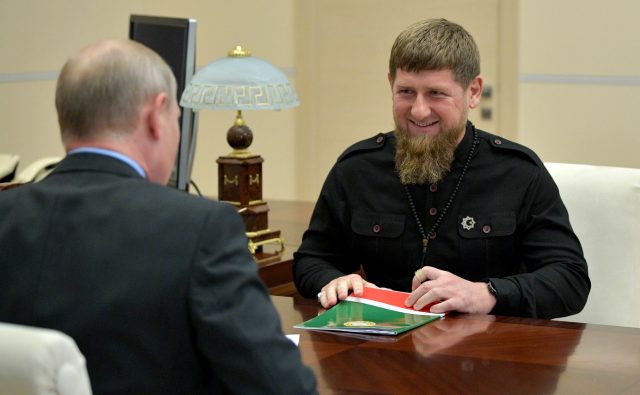
Ethnic Strife Resurgent in Russia
Publication: Eurasia Daily Monitor Volume: 20 Issue: 169
By:

Anti-Semitic demonstrations in various cities in the North Caucasus marked the end of October. On October 29, in Dagestan, several hundred people broke into the Flamingo Hotel in Khasavyurt demanding the removal of Jews who had recently arrived from Israel (Ura.news, October 29). On the same day, at the airport in Makhachkala, up to a thousand people waited for the arrival of a flight from Tel Aviv. The protesters, demanding the expulsion of Jews from the region, invaded the airfield and tried to check the documents of people leaving the airport to ensure that they were not Israelis (Svoboda, October 29). The Jewish community in Dagestan began to seriously consider the possibility of a mass exodus from the republic to flee the protests (Zona.media. October 29).
The head of Dagestan, Sergey Melikov, claimed that the anti-Semitic actions in Khasavyurt were caused by “fakes circulated by the enemies of Russia” (Zona.media, October 29). The Russian Foreign Ministry asserted that the riot at the Makhachkala airport was “a planned provocation organized abroad,” specifically in Ukraine, with the goal of “destabilizing the situation in Russia and discrediting the country internationally” (Ministry of Foreign Affairs of the Russian Federation, October 30). The Investigative Committee in Dagestan also expressed its displeasure and launched a criminal case against the protestors under the law forbidding the organization of mass riots (Vedomosti, October 29).
The spark for this riot most likely came from within Russia. Contrary to the Kremlin’s narrative that the riots were organized outside the country, it was the behavior of Russian politicians that led to a sharp surge in anti-Semitism in the North Caucasus. On the eve of the protests, the head of Chechnya, Ramzan Kadyrov, characterized Israel’s actions in Palestine as “fascist” and wrote that “Israeli fascism today is in no way inferior, if not superior, to Hitler’s” (RBC, October 29). Earlier, Kadyrov had reprimanded Muslim countries for allegedly not standing up for “their own” (Т.me/RKadyrov_95, October 9).
Kadyrov has been trying to position himself as “the defender of Muslims and the servant of the Blessed Koran” for several years (Grozny.tv, July 21. 2020). His conduct should not be surprising, as he has periodically criticized both European leaders and Arab countries for their lack of action (Kavkazr.com, August 17). According to Ukrainian and Crimean Tatar journalist Osman Pashayev, the Russian state is trying to enlist the support of the billion-strong Islamic ummah and convince them to justify Russian aggression against Ukraine. Pashayev believes that Moscow is trying to influence the countries of the Global South, primarily Indonesia and Nigeria (Kavkazr.com, October 23).
Several of Kadyrov’s actions are directed exclusively at an internal audience in Russia and are no less conflicting than his pronouncements on international issues. Recently, Kadyrov’s 15-year-old son, Adam Kadyrov, received his third state award in a month, the Order of Merit for the Karachay-Cherkess Republic. He was previously awarded the second-most prestigious award in Tatarstan, the Order of Friendship, “for his significant contribution to strengthening interethnic and interfaith peace and harmony.” Before that, he was awarded the title of “Hero of Chechnya” (BBC News Russian, October 25).
The “heroism” of the younger Kadyrov is limited to the public beating of 19-year-old Nikita Zhuravel, who was accused of burning the Koran, in a pre-trial detention center. On October 19, a deputy from Tatarstan, Azat Khamaev, mentioned the incident, adding a rhetorical question: “What kind of legal climate do we live in today?” Subsequently, Khamaev was forced to apologize for his words (Kavkazr.com, October 25).
Well-known Russian political scientist Vladimir Pastukhov suggests that the praise for the younger Kadyrov is due to the religious fanaticism and irrationality of Ramzan Kadyrov (YouTube, October 27). Mikhail Khodorkovsky, a former political prisoner and opposition activist, believes that the elder Kadyrov deliberately provokes religious discord to intimidate the Russian people and become someone to fear, similar to the khans of the Tatar-Mongol yoke, whom the Russian people obeyed under threat of reprisals (YouTube, October 27).
If these interpretations are correct, then the Kremlin is pushing two conflicting narratives. One of the Kremlin’s widespread myths was the idea that Vladimir Putin not only “reconciled” Chechnya with Russia following the Second Chechen War but helped give birth to a special fraternal friendship between the Russian and Chechen peoples. Ramzan Kadyrov strongly supports this myth, claiming that “Putin put an end to terrorism in Chechnya” (360tv.ru, February 26, 2021).
Stories in which ethnically Russian troops fight alongside Chechen fighters have become especially popular since the beginning of Moscow’s full-scale invasion of Ukraine (Live24.ru, June 10, 2022). Such propaganda makes it easier for the majority of Russians to accept the Chechen leader’s harsh statements, especially given the fact that his words in no way affect their daily lives.
At the same time, nationalist statements and discontent over the “infringement of Russians” is spreading among the Russian military. An article criticizing discrimination laws appeared at the end of October on the “Military Review” website, which is closely connected to the Russian Ministry of Defense. It focused specifically on Article 282 of the Russian Criminal Code, relating to the “public incitement of hostility on the grounds of gender, race, language, nationality, origin, [and] attitude to religion.” The article’s authors assert that this norm is “anti-Russian” since only “representatives of the ethnic majority” bear responsibility for discrimination (Topwar.ru, October 26).
The veil of peace between Russia and Chechnya hides the reality of the fraught relationship between Russians and Chechens. Even before the death of Yevgeny Prigozhin, independent journalists predicted a possible clash between Chechens and the “Wagnerites” (Novayagazeta.ru, June 24). This prediction may soon come true. Kadyrov’s actions, largely ignored by the passive Russian majority, may be increasingly resented by aggressive Russian nationalists, especially among those who have experienced war. This resentment may escalate into an open clash in the near future.



